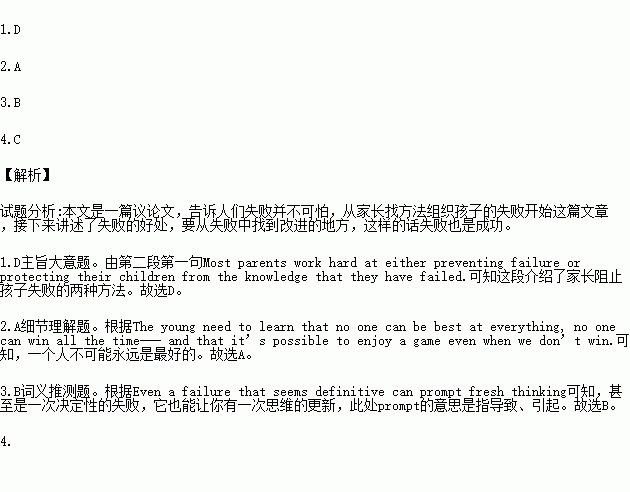题目内容
Why are so many people so afraid of failure? Quite simply because no one tells us how to fail so that failure becomes an experience that will lead to growth. We forget that failure is part of the human condition and that every person has the right to fail.
Most parents work hard at either preventing failure or protecting their children from the knowledge that they have failed. One way is to lower standards. A mother describes her child’s hasty-made table as “Perfect!” even though it doesn’t stand still. Another way is to shift blame. If John fails science, his teacher is unfair or stupid.
The trouble with failure-prevention devices is that they leave a child unequipped for life in the real world. The young need to learn that no one can be best at everything, no one can win all the time--- and that it’s possible to enjoy a game even when we don’t win. A child who’s not invited to a birthday party, who doesn’t make the honor roll on the baseball team, feels terrible, of course. But parents should not offer a quick consolation, prize or say, “It doesn’t matter.” because it does. The young should be allowed to experience disappointment—and be helped to master it.
Failure is never pleasurable. It hurts grown-ups and children alike. But it can make a positive contribution to your life once you learn to use it. Step one is to ask “Why did I fail?”
Don’t blame someone else. Ask yourself what you did wrong, how you can improve. If someone else can help, don’t be shy about inquiring. Success, which encourages repetition of old behavior, is not nearly as good a teacher as failure. You can learn from a bad party how to give a good one, from an ill-chosen first house what to look for in a second. Even a failure that seems definitive can prompt fresh thinking, a change of direction. After 12 years of studying ballet, a friend of mine auditioned for a professional company. She was turned down. “ Would further training help?” she asked. The ballet master shook his head. “ You will never be a dancer”, he said, “You haven’t the body for it.”
In such cases, the way to use failure is to take stock(估量) of the situation bravely asking, “What have I left? What else can I do?” My friend put away her shoes and moved into dance treatment center, a field where she’s both able and useful. Failure frees one to take risks because there’s less to lose. Often there is recovery of energy—a way to find new possibilities.
1.The second paragraph tells us ___________
A. how a mother praised her children
B. parents should blame their children at the proper time.
C. how to shift blame
D. two ways of failure prevention most parents use when their children fail
2.According to the author, what should a child know in the real world?
A. No one can be best all the time at everything.
B. He should be equipped for life.
C. No parents should offer quick consolations.
D. He can get pleasure from failure as well as success.
3.The underlined word “prompt” in the fifth paragraph can be best replaced by “_________.”
A. prevent B. cause C. continue D. exchange
4.From the passage we know that ______________.
A. success lies in hard work
B. never be disappointed to life
C. failure can affect one’s life greatly once he learns to use it.
D. everyone had his own value

